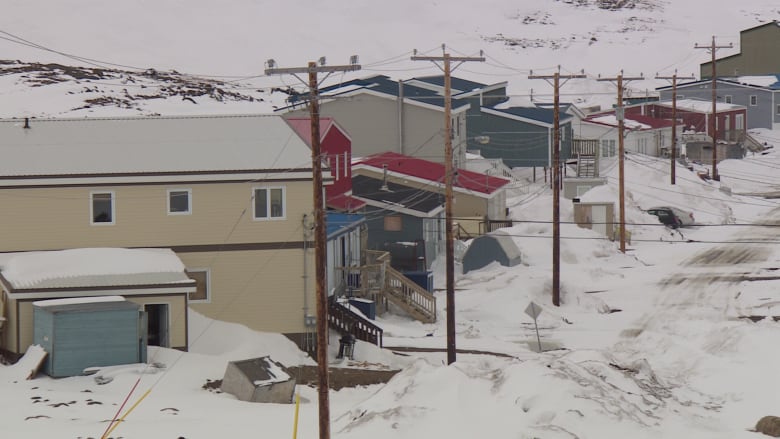Surging housing prices in Iqaluit have many feeling hopeless
'It gives me no hopes and dreams that I'll ever be able to own a home in my hometown'

Sky high housing prices and a ruthless market have many lifelong Iqaluit residents feeling hopeless that they will ever be able to become homeowners.
"It gives me no hopes and dreams that I'll ever be able to own a home in my hometown," said Connie Nowdluk, a 41-year-old resident who grew up in the city.
A lack of available housing in the rapidly growing city has led to a surge in housing prices.
Over the last two years local Iqaluit sell and swap Facebook pages have become the main bulletin board for what's for sale in the city.
Some recent houses posted for sale on these pages include a one-bedroom, plus den, converted 816-square-foot trailer for $475,000. Or a three-bedroom, one-bathroom house at 1,040 square feet posted for $600,000.
This is what makes me think I’ll never own a home. Here where I was born and raised just like generations before me. As my Anaana(grandma) says we are original Iqaluingumiut(sp?) But the prices of houses that are on sale make me think that’s never going to happen. <a href="https://t.co/HgOr4zyGbb">pic.twitter.com/HgOr4zyGbb</a>
—@NaulaqKaaniThis is even if the price is posted at all. Many posts say to message the seller for the asking price or simply to make an offer.
These are the kinds of posts that have Nowdluck worried about the future.
She currently lives in staff housing with her mother and isn't looking to buy, but knows they won't be able to live in staff housing forever.
"We all need to strive towards something that we can have hopes and dreams for, that we don't have to be run out of Iqaluit just to find a home," said Nowdluk.
But even people looking to buy have said the market is discouraging.
Rob Comeau, a 27-year-old law articling student from Iqaluit, has been trying to buy a home in the city for the last year with no luck.
He says the houses he sees posted on Facebook are "astronomically priced."
"The only way that I see this working out for myself at a decent price point is word of mouth," said Comeau. "Just finding somebody that's selling and getting to them and making them an offer before it hits the market."
Iqaluit's only realtor says prices have jumped
This is common practice for sellers and buyers in Iqaluit, according to the city's only real estate agent, John Matthews.
"There has been a substantial increase in the average price of houses that are being sold in Iqaluit," said Matthews, who for the last 30 years has been running Atiilu Real Estate and Property Management.
Atiilu is the only real estate website that lists houses for sale in Iqaluit.
"It's become much more of a seller's market during the past year or two years than it was in the past," said Matthews.
Matthews says his past advice to his clients was not to jump into anything too quickly, but that advice no longer stands.
"Now that's not so true, because if you don't jump into a purchase, you may lose it," said Matthews.
His advice to buyers in Iqaluit is to try and protect themselves by not waiving contingencies when putting an offer on a property.
"Keep the conditions in place, make sure you get a good, thorough inspection of the house and be comfortable in the house," he said.
Matthews says the surge in housing prices is partly a reflection of the high cost of construction and the upward trend in the housing market across the country, but also a lack of development of new properties by the City of Iqaluit.

Iqaluit water supply impedes future developments
Iqaluit's Mayor Kenny Bell, doesn't disagree that the city has dragged its feet on developing land for more housing. But he says the city's insufficient infrastructure has any future development at a standstill.
According to the City of Iqaluit's Housing Action Plan 2022 to 2031, "The City is in crisis with respect to its infrastructure, as there is a lack of sufficient utilities … transportation infrastructure and overall capacity to support additional housing development."
The quantity of water available for residents of Iqaluit is maxed out.
The city needs a new water source in order to have any more development and it will cost $180 million from the federal government to build it.
"We can't not get it [the money]," said Bell. "If we don't, Iqaluit ceases to grow and we'll be the same size forever, which you know, obviously is just not possible."
According to the Housing Action Plan, the city plans to develop 1,400 new housing units over the next 10 years starting Jan. 1, 2022.
Of those, 700 of these units will be below market affordable housing.
The plan says "the city needs to grow up, not out," and would densify housing in the downtown core.

Bell says this would make the city more walkable and alleviate some of the city's traffic congestion.
"Historically, there has been really bad planning here [in Iqaluit]," said Bell.
Bell says in order to achieve the goals of the city's action plan, it will need the financial support of all levels of government and Inuit organizations.